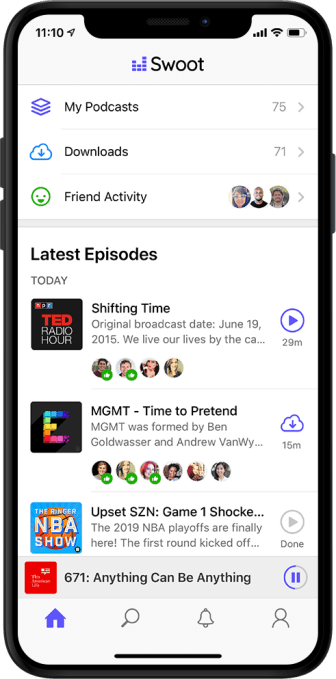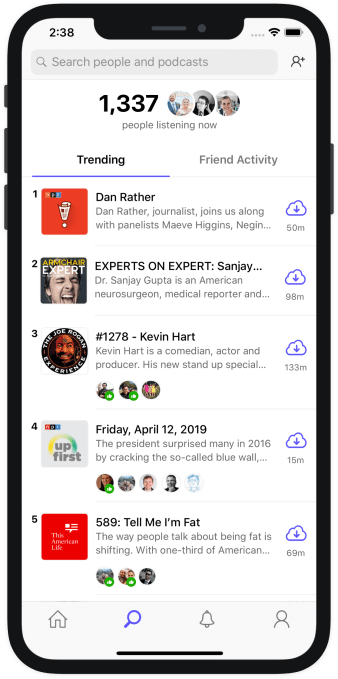HipChat founders launch Swoot, a social podcast app
Pete Curley and Garret Heaton, who previously co-founded team chat app HipChat and sold it to Atlassian, are officially launching their new product, Swoot, today. The app makes it easy for users to recommend podcasts and see what their friends are listening to.
This might seem like a big leap from selling enterprise software — and indeed, Curley said the company was initially focused on creating another set of team collaboration tools.
What they realized, however, was that HipChat is “actually a consumer product that the company just happens to pay for, because the employees demand it” — and he said they weren’t terribly interested in trying to build a business around a more traditional “top-down sales process.”
Meanwhile, Curley said he’d injured his back while lowering one of his children into a crib, which meant that for months, his only form of exercise was walking. He recalled walking around for hours each day and, for the first time, keeping himself entertained by listening to podcasts.
“I was actually way behind the times,” he said. “I didn’t know this, that everyone else was listening to them … This is like the dark web of content.”

The startup has already raised a $3 million seed funding round led by True Ventures .
“Pete and Garret both have incredible product and entrepreneurial experience, plus they have built successful businesses together in the past,” said True Ventures co-founder Jon Callaghan in a statement. “Their focus of solving the disjointed podcast listening experience through Swoot’s elegant design fills a clear gap in media discovery.”
Discovery — namely, finding new podcasts beyond the handful that you already subscribe to — is one of the biggest issues in podcasting right now. It’s something a number of companies are trying to solve, but in Curley’s view, the key is to make the listening experience more social.
He noted that social sharing features are getting added to “literally everything,” including your bathroom scale, except “the one thing that I actually wanted it for.”
Curley also contrasted the podcast listening experience with YouTube: “We don’t realize how big [podcasting] is because there is no social thing where you see that Gangnam Style has 8 billion views, and you realize that the entire world is watching. There’s no view count, no anything that tells you what’s popular.”
So he’s trying to provide that view with Swoot. Instead of focusing on overall listen counts (which might not be that impressive in a new app), Swoot gives you two main ways to track what’s popular among your friends.

There’s a feed that shows you everything that your friends are listening to or recommending, plus a list of episodes that are currently trending, with little icons showing you the friends who have listened to at least 20 percent of an episode.
Curley said the team has been beta testing the app by simply releasing it on the App Store and telling friends about it, then letting it spread by word of mouth until it was in the hands of around 1,000 users. During that test, it found that 25 percent of the podcasts that users listened to were coming from friends.
Curley also noted that this approach is “episode-centric” rather than “show-centric.” In other words, it’s not just helping you find the next podcast that you want to subscribe to and listen to for years — it also helps surface the specific episode that everyone’s listening to right now.
“In the 700,000 shows that exist, if you’re the 690,000 worst-ranked show, but you have one great episode that should be able to go viral, that’s basically impossible to do right now, because audio is crazy hard to share,” Curley said.
In the course of our conversation, I brought up my experience with Spotify — I like knowing what’s popular, but when a friend recently mentioned specific songs that they could see I’d been listening to on the service, I was a bit creeped out.
“It’s funny, I actually thought, how ironic that Spotify is getting into podcasting now [through the acquisitions of Gimlet and Anchor],” Curley replied. “They actually had this correct mechanism applied to the wrong thing. Music is a deeply personal thing.”
Which isn’t to say that podcast listening isn’t personal, but there’s more of an opportunity to discover overlapping interests, say the fact that you and your friends all listen to true crime podcasts.
Curley also said that the app is deliberately designed to ensure that “the service does not get worse because a ton of people follow you” — so they see what you are listening to, but they can’t comment on it or tell you that you’re an idiot for listening.
At the same time, he also said the team will be adding a mode to only share podcasts you actively recommend, rather than posting everything you listen to.
As for making money, Curley suggested that he’s interested in exploring a variety of possibilities, whether that’s integrating with other subscription or tipping services, or in creating ad opportunities around promoting podcasts.
“My actual answer is, there are a bunch of people trying to monetize right now, but I don’t think there’s a platform even close to mature enough to even try to monetize podcasting yet, other than podcasters doing their own advertising,” he said. “I think the endgame, where the real money is made in podcasting, actually hasn’t been come up with yet.”
Powered by WPeMatico